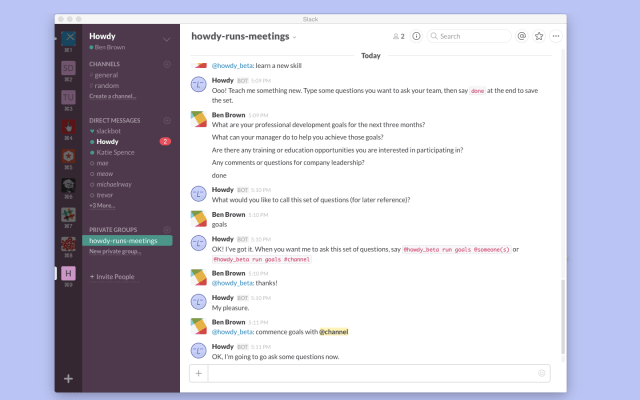Despite a checkered history with online platforms, developers are always looking for the next big distribution model and a small but growing number is betting Slack, the popular group-messaging platform, is the way to go.
One such startup, Austin-based Howdy, may be the first to nab venture funding based largely on that vision. Specifically, the company, which has developed a customizable chat bot application that runs automated tasks for teams on Slack, has just nabbed $1.5 million in venture funding from Bloomberg Beta, True Ventures, a small angel group called Outlier and numerous individual investors.
Howdy is first and foremost a time saver for now, especially when it comes to meetings. For example, after connecting to Slack, the app can simultaneously message each member of a team, collecting status updates that can be archived and viewed by everyone. The idea: to keep meetings from turning into one long catch-up session and enabling attendees to focus on decision-making instead. (Worth noting: Howdy can also be used to collect everyone’s lunch orders. It’s up to the team using it.)
Howdy co-founder Ben Brown says the still-in-beta company will eventually charge customers on a monthly basis but that it’s a “little early to know the details.” What he says he does know is that providing applications, content and services via messaging applications is becoming a “huge opportunity.”
He’s so bullish, in fact, he says Howdy will look to work with other enterprise messaging services going forward, even though it’s “primarily interested in Slack” and its 1 million users (and counting).
That’s probably smart. Slack opened itself up to more third-party content in a late-August update. And Brown notes the company has been “very supportive of what we’re doing,” adding that he’s “in direct contact with Slack’s platform integrations team on a near day-to-day basis.”
Still, companies have been known to lose their enthusiasm for certain third-party integrations, sometimes abruptly. (Yes, we’re talking about much larger Facebook and Twitter.)
Asked if he’s at all concerned about putting his new startup at the mercy of a bigger platform provider, Brown — who has co-founded several companies previously, including an early social network that sold to CNet for $1.2 million in 2006 and a software design consultancy — says he isn’t.
“I’m very positive about working alongside Slack, and I think there will be a hopping market of commercial plug-ins for the platform that will emerge in the next couple of months. We just happen to be one of the first.”
